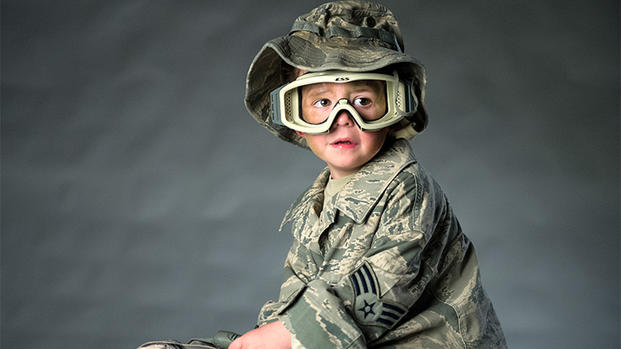First, let's talk about mom guilt.
Before becoming a parent, I couldn’t possibly have understood how pervasive and profound “mom guilt” would be. Thanks to social media, we are constantly battered by the 1,001 ways that we might be damaging, benignly neglecting or otherwise hindering our kids. And that’s before you add in the impact of frequent moves, the regular absence of one parent, constantly changing routine and the lack of local extended family experienced by so many military families.
When we PCSed to Fort Leonard Wood, Missouri when our son was two-year-old, all of the pressure mom guilt could invoke came crashing down when my little munchkin decided that he hated his new bedroom. Maybe it was because our new house was 1,000 square feet smaller or because it was his first move, but there was no reconciling him to that room.
We lived in that house for 13 months until a roof leak forced housing to move us. In 13 months, I could count on one hand the number of times my child slept in his own bed. He figured out every door baby-safe device I could buy at Walmart, Lowes, Home Depot or Amazon. He slept on the floor next to the door, in the hallway, on the couch, on the floor in our room or in our bed. For months, I tried everything I could think of to convince him that his room was the coolest thing ever. We tried toys, glow-in-the-dark stars on the ceiling and every night light we could find.
I gave up on the morning I awoke to find my nimble-fingered almost-3-year-old had disassembled yet another baby proofing gadget and was curled up at the foot of my bed shivering in his sleep. My heart broke in pieces as I realized he hadn’t climbed under the covers because he didn’t want to risk waking me up and being taken back to his room. Instead, I put his toddler bed mattress into our room and he slept there until we moved.
Military Kid Challenges
There is no doubt that military life is challenging for our kids. Frequent moves, even more frequently moving friends, deployments, separations for many other reasons and stressed parents don’t make for the most serene childhood. In an effort to offer us education and resources, it feels at times that we are constantly confronted with the importance of minimizing the impact of those challenges. The discussion within the military community is often so focused on the negative impacts in a well-intended effort to educate and attract more resources that I sometimes wonder if we do as much harm as good.
For each of the challenges they face, our kids are also presented with wonderful opportunities. Their communities are inherently rich in a variety of cultures, backgrounds and even languages as they reflect the diversity of the military population. Julie Provost reflects that her children “have been able to meet more people and see more things than they would have” because of her husband’s military career.
On a regular basis, military functions or casual social calls bring together military kids who I watch introduce themselves, and then start playing with the ease of longtime friends. My own son, despite being on the quiet side, is remarkably confident when it comes to meeting new people. He is cautious and assessing, then confident once he feels he has a grasp of the situation. Considering his preference for things to be precisely as he likes them and a strong love of routine, it amazes me each time he joins a group of new, instant friends. He has learned coping skills that I struggle with as an adult. Experience has taught him that he can observe a group of people for a short time and have enough information to confidently interact – a skill I doubt he would have if our life had allowed him to retain the routine he prefers.
The Stories We Tell Ourselves
As parents we know the power of perspective and attempt to shape challenges into the best possible light for our kids.
“I bet you’ll make a TON of new friends at your new school.”
“Look, there’s a pool right down the road from our new house.”
The same principle applies to the conversation about the greater impact of military life. PCSing is hard, but it also teaches our kids to be resilient and flexible. Deployments are difficult and emotionally-trying, but can help a child to discover their independence. Separations are frustrating, but help us to appreciate the time we have together as a family. For each challenge, we can choose to recognize the hardship but focus on the opportunity.
That Unique Advantage
My husband regularly remarks on our son’s lack of interest in superheroes, but it doesn’t surprise me in the least. Every day he sees what service looks like when it is lived. We have family friends who have been injured and killed in action. We bring meals or leave gifts to someone struggling with a deployment. He watches cars pull to the side of the road as soldiers render honors to the flag during Reveille and Retreat. He is growing up with gaggle of quasi-aunts and uncles who help to celebrate birthdays, clean the house before homecomings and share dinners over Skype when our loved ones are away. Before he finishes elementary school, he has learned the most important lesson it took me years as a military spouse to absorb: that relationships – marriage, friendship, professional – take work and investment to sustain. If he takes only that away from our time as a military family, I’m confident he will come out ahead.
I know that in the dark moments when your child is crying because they miss their friends, asking for a deployed parent, stressing about a new school or hating a new house, our natural reaction is to wish we could take away the challenge and make life simpler. We will wrestle with that feeling so many times as our little ones grow to take on the world in ever increasingly frightening ways. Like any of those challenges, we will do our best to empower and educate our children so they are prepared for military life’s bends and bumps. We can, and should, advocate for our children through efforts like the Military Child Education Coalition. We can, and should, look for opportunities to buoy our children by utilizing resources like Operation Purple Camps. And in the meantime, we will soothe hurts and encourage hearts as our amazing kids build a set of life skills and experiences any adult could be proud of.
Each child is an individual and every family’s military experience will be different. But, we’re all just doing the best we can to make the right decisions with the information and resources we have. And that’s okay.
They might sleep in a hallway now and then, hate their room or miss their friends, but being a military family won’t break your kid.









